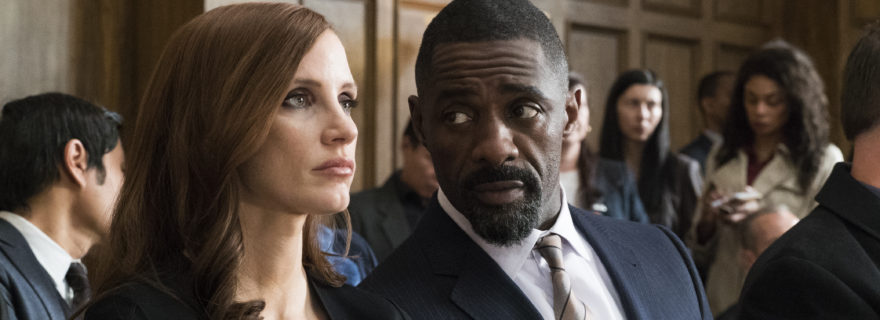'Molly's Game'
Movie Rating:
2.5
After writing a few good screenplays that were tamed by a few good directors (‘The Social Network’, ‘Steve Jobs’, ‘A Few Good Men’, etc.) Aaron Sorkin has finally gone ahead and directed a movie himself. It’s called ‘Molly’s Game’, based on the secret-spewing biography by underground poker goddess Molly Bloom.
The subject is ripe for Sorkin’s brand of smugly self-satisfied, rapid-fire quips and monologues. The movie even has a handful of damn fine scenes and sequences. Unfortunately, letting Sorkin run the show means that his weaknesses and excesses have never been more prominent or harder to ignore… even if all his strengths are on display as well.
For those who don’t know, Molly Bloom was an Olympic-class skier turned underground poker organizer. Never heard of her? Well, the movie assumes that. In fact, it opens with a seemingly endless, heavy-handed prologue in which Sorkin sets up the character by way of the injury that prematurely ended Bloom’s skiing career. The sequence encapsulates what works and what stinks about the movie. Jessica Chastain absolutely slaughters her wordy monologue, getting in all the jokes and pathos without losing the deadpan acting style that the writer craves. Sorkin proves to be a surprisingly adept director in pulling together a fairly intense ski injury set-piece timed liked music to his monologue. It’s impossible not to admire all the wit and skill that goes into the prologue, but it’s also equally impossible to ignore how completely superfluous and pretentious it all is. The construction is wonderful to behold. The impact of the big, long, overblown, and ultimately overthought joke? Less so.
Sadly, things don’t get better once Sorkin gets to the meat of his story. It just gets longer. The tale then picks up with Chastain’s Molly hiring attorney Charlie Jaffey (Idris Elba) to defend her in a court case over her bookmaking and poker practices. Through flashbacks, we learn about how Ms. Bloom overcame the crushing defeat of her potential Olympic career. She takes a crappy job and finds herself preyed upon by crappy men. However, the job ushers her into a world of underground poker involving celebrities and moguls and money and power that she can’t resist. She starts her own game, using her celebrity players to lure in the big fish. Much money is made. Bloom feels powerful and with purpose. Obviously, there’s bad behavior (primarily in the form of an amusingly cast Michael Cera playing a movie star jerk of a gambler based on Tobey Maguire), but Molly keeps it all in her control… until she doesn’t. She slowly breaks all her rules, the Mob gets involved, and blah blah blah. Bad things happen.
It’s a rather amusing and clever story that piqued Sorkin’s interest for obvious reasons. Molly is a fascinatingly flawed character in the ways that Sorkin likes to study (arrogance, hubris, etc.). Her gender allows him to play with timely societal roles and identity politics. Her underground legacy lets him satirize celebrity and serve up high stakes poker set-pieces like it’s the early 2000s again. The overarching structure involving a court case allows him to put Molly’s character and passion on trial in dramatic and painfully obvious ways. Plus, she’s too smart for her own good and is a character designed for Sorkin’s brand of wordy gamesmanship. Much of that is fun and Chastain has a ball spitting out her barbs and marching through a man’s world with poise and grit, but Sorkin knows no sense of subtlety. Eventually that topples the picture over the course of its butt-numbing two hour and twenty minute running time.
All of the dated poker analogies, smug speeches, and tiresome sports metaphors would be enough to sink ‘Molly’s Game’… and then Sorkin starts playing dime store Freud with Bloom’s psychologist father. It peaks with a two-hander therapy session that says the movie’s themes aloud in what might be the most grating and oblivious scene that Sorkin has ever written. Take that scene out and the whole movie improves. Leave it in and ‘Molly’s Game’ plays like a feature length exploration of everything Sorkin does wrong as a writer when left unchecked.
Still, ‘Molly’s Game’ contains enough genuinely funny and poignant dialogue exchanges to please those who adore Aaron Sorkin’s brand. While the movie demonstrates that he needs an editor to chop up his scripts, he does prove to be surprisingly adept as a visual storyteller. If Sorkin can ever get over the sound of his own voice, he might even direct a damn fine motion picture. Until then, the guy really needs a David Fincher figure to keep him in line and tone down his excesses. All of which makes ‘Molly’s Game’ a great big cautionary tale for unchecked ego, both in the ways Aaron Sorkin intended as a storyteller and in ways that he hasn’t quite figured out about himself just yet.




Bolo
I generally enjoyed this one. I had never heard of this woman before this film, so I don’t know what’s real and what has been bent or outright fabricated so that Sorkin can tell the story he wants to tell. Parts of it were really hard to believe. Especially the part where she shows up in New York with only a fistful of dollars and instantly recruits a Charlie’s Angles squad of genius superhacker socialite Playboy models who are all available and eager to work for Molly.
The film also presents it that Molly’s motivation for protecting the identities of her patrons is entirely driven by ethics and not in the least by a fear of reprisals. Even in a movie, that’s a bit hard to swallow.
But still, there are lots of funny scenes, and Sorkin did get me invested in Molly’s struggle to maintain her sense of self-respect.
incontact login
i like molly’s games. <3<3<3<3